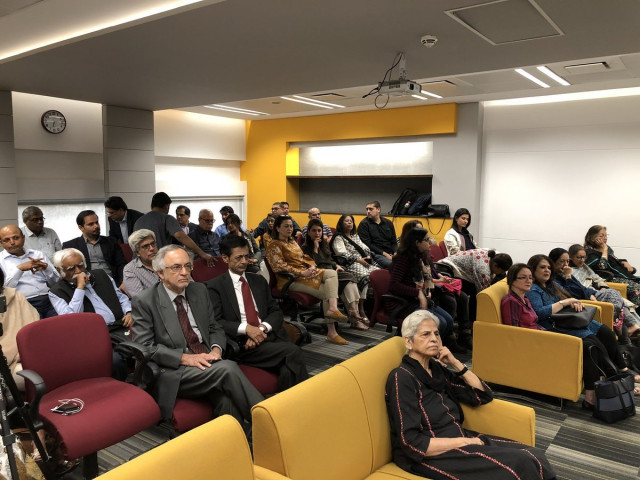Remembering Razia Bhatti - who stood fast and spoke the truth
Inaugural session of lecture series pays tribute to one of the most courageous journalists the country has seen

PHOTO: CEJ
As a human-rights advocate, IA Rehman, read out this excerpt from the editorial published by Razia Bhatti in the first issue of Newsline magazine in July 1989, it dawned on the audience how true these words hold even today.
Rehman was speaking at the inaugural session of the Razia Bhatti Memorial Lecture series held at the Centre for Excellence in Journalism, Institute of Business Administration, on Monday. "Razia Bhatti was a born journalist," said Rehman. "She had no tolerance for injustice, violation of the rule of law or exploitation of the underprivileged," he reminisced
Razia was also a feminist to the core but refused to be subjected to the constraints of gendered roles.
At the start of the session, Umber Khairi, one of the founding members of Newsline, also addressed the audience through a recorded message in which she spoke of the challenges plaguing journalism in Pakistan. She also detailed Bhatti's valiant efforts to publish the truth.
The Razia Bhatti Memorial Lecture series was conceptualised around a year ago by the CEJ and the Razia Bhatti Memorial Initiative to honour the pioneering editor.
Bhatti, a former editor of the Herald, founded the journalist-owned publication Newsline with her editorial team in 1989 and was the winner of a number of national and international accolades, recognising her professionalism and commitment. "She [Razia] was at the peak of her career when she did not even hesitate to walk out of Herald, refusing to let her pen be of service to General Ziaul Haq," he recalled. It also spoke of the leadership qualities that her entire team resigned with her, said Rehman, before going on to launch the Newsline venture.
Later, Rehman remembered, Bhatti had only one regret. That after resigning from the Herald in the late 1980s, she was not able to bring out Newsline during Zia-ul- Haq's lifetime. Sharing an anecdote of Bhatti's rapport with the dictator, Rehman said that Ziaul Haq believed Bhatti and the team at the Herald would support his coup because they had always been so vocal against his predecessor. He even invited the team to Islamabad after taking over. Little had he known that the same team would refuse to toe the line and hold him to the same light. In fact, Rehman said, there came a time when Ziaul Haq waved a copy of the Herald at a press conference, "saying he will not allow this kind of journalism".
Speaking on the right to freedom of speech, Rehman said that citizens in those days enjoyed the right to publish and the news was not curtailed even in the time of war. The right to publish was considered a fundamental right and it was easy to get a declaration to print a newspaper. "Today, new laws are being introduced to curtail free speech even further," he said, citing the cyber-crime law as an example. "Back then, we feared our enemies. Today, we must even fear our friends," he lamented.
Rehman, who is also a former chairperson of the Human Rights Commission of Pakistan, praised the work being done by the CEJ. "Journalism is at its last catch and the CEJ is working tremendously to work for journalism," he quipped.
Published in The Express Tribune, March 5th, 2019.


















COMMENTS
Comments are moderated and generally will be posted if they are on-topic and not abusive.
For more information, please see our Comments FAQ